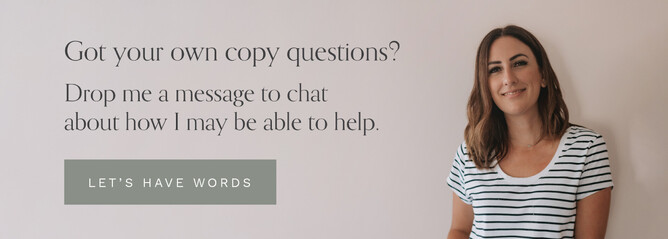I know exactly what it’s like when you’re starting up your new business; changing from your ‘sales person hat’ to your ‘bookkeeping hat’ to your ‘marketing hat’ and many more throughout the day is exhausting, overwhelming and often daunting. While I’m (obviously) a cheerleader for outsourcing to specialists, I also know what it’s like to be on that new-business budget, and I myself had to quickly upskill on previously uncharted aspects of business until my admin time decreased and my cashflow increased and I could hand it off to an expert.
It’s likely that if you’re a new business, you’ll be setting up a new website. And also likely that you’ve been sitting staring at a blank screen for some time now, wondering just what the heck you are supposed to write… where is that ‘copywriter hat’ when you need it?
Here are my top tips for start-up DIY website copywriting – they are simple ideas because you don’t have to be an expert, but will help you create web content that gets those much-needed clients through the door during your start-up phase.
Connect through conversation
If a potential client walked in to your store or office, what would you say to them? How would you want them to feel? What kind of language would you use? And what kind of tone? It’s important that your website copy is a reflection of the way that you interact with customers conversationally (just with good spelling and proper grammar!). Think about how you would address your client to demonstrate how your services can help them, as you would if you were speaking to them face-to-face. Note that conversational doesn’t mean casual or unprofessional – if you don’t use slang or poor sentence structure when you speak, then you shouldn’t in your web copy. By ‘conversational’ I mean, friendly, personal and relaxed.
Less about me, more about you
In keeping it conversational, make sure you’re speaking directly to your customers. Avoid terms such as ‘clients’ or ‘customers’ and instead refer to your readers using ‘you’ or ‘your’. As much as I’m sure you want to tell them all about yourself, your website is really about your customers and what you can do for THEM. Therefore, for example, instead of saying “After-hours appointments available”, use something like “We know life is busy, so if you need a little flexibility to work around your schedule, we offer after-hours appointments in the evening and on Saturdays”.
Did you feel a difference in tone when you read that?
Cull the waffle and refine your message
Think about your own behaviour when you visit a web page. Do you spend time reading pages of text that isn’t relevant to your search, or do you scan until you see information that answers your question? I know you’re excited about your new business and you want to tell the world about your amazing services, but remember it is much more powerful to have a clear, succinct marketing message rather than going into the intricacies of your business processes. If you’ve nailed your 1 minute elevator pitch then you can nail your website’s marketing message. This is where an outsider’s perspective is great, so if you can’t use a copywriter, use your business coach or business contacts to help you trim the fat.
Tell your story
People love stories! And storytelling is an underrated business skill. We remember stories, so think about sharing yours. Why are you doing what you’re doing or selling this particular product? How did the business come about? What are your values, aims, ambitions with your business? Readers will pick up on your passion and will relate and connect with your story, whether it is to educate or to entertain.
Bullet Proof
- Use bullet points where applicable to break up large amounts of text
- It makes it easier for readers to see relevant information
- Helps trim down that fat we mentioned earlier
- Adds clarity
- Works, huh?
Proofreed, Proofreed, Proofreed
Typos and errors are ugly and distract from the professional image and message of your site. Ask a colleague or friend to give it a once over, not just for spelling and grammar but also for confusing sentence structure or industry jargon.
K.I.S.S
If you’re still stuck for words, then don’t stress. Keeping it simple is best and less is more when it comes to websites. Just make it as easy as possible for readers to get in touch with you for more information – every page should have a direct link to contact you.
Hey, if all else fails, take some advice from Ernest Hemingway and have a crack at your web content after a few wines… (it works!)
And when the time comes that you need a professional touch, I’m here to help you package up your information for a strong web presence.


